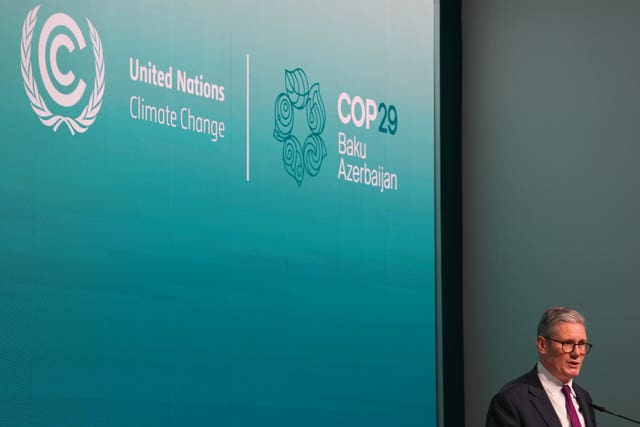
Wealthy countries must more than double the amount of climate finance paid from taxpayers’ money annually by 2030, UN-appointed experts said.
The Independent High-Level Expert Group on Climate Finance (IHLEGCF) assessed how much money will be needed to meet the 2015 Paris Agreement goals, which aim to limit dangerous global warming.
The new report is set to be launched on Thursday at the UN Cop29 climate summit in Azerbaijan, as world leaders and delegates seek to iron out a new finance agreement.
Richer countries previously pledged 100 billion US dollars a year in private and public finance to help developing nations green their economies and adapt to inevitable climate change impacts, as part of efforts to secure the Paris treaty.
But countries agreed that a new agreement on climate finance should be set before 2025.
As nations now hammer out those details at Cop29, the IHLEGCF said a total of one trillion US dollars needs to be flowing into developing countries each year by 2030, bar China, to meet the Paris Agreement goals.
Within this, the group outlined the amount of public money richer governments will need to give developing countries.
Currently, around 43 billion US dollars per year in this “bilateral public funding” is flowing from developed to developing countries, the analysis said.
But this needs to increase to 80 to 100 billion US dollars per year by 2030 for the world to meet the Paris Agreement goals, according to the experts.
But that is not all, as bilateral funding is not the only public money that richer governments pay towards climate finance.
They also contribute money to multilateral development banks – like the World Bank – which then direct climate finance to developing countries.
For example, the UK Government has pledged to spend £11.6 billion over five years to 2026, mostly through bilateral climate finance but also including money it pays to multilateral banks.

To meet their share of the one trillion US dollars, the IHLEGCF said that multilateral banks will need to triple financial flows to developing nations by 2030 – to around 250 to 300 billion US dollars.
Beyond this, the report said: “The large and rapid scale-up of finance to support a big investment push can only be achieved by harnessing all pools of finance.”
It said around half of the one trillion – so between 450 and 550 billion US dollars – should be flowing into developing countries from private investment.
Professor Nick Stern of the Grantham Research Institute on Climate Change and co-chairman of the high-level group said this is “what’s necessary to deliver on Paris”.
The report warned that any shortfall in investment before 2030 will place added pressure on the years that follow and therefore create “a steeper and potentially more costly path to climate stability”.
“The less the world achieves now, the more we will need to invest later,” the report noted.
“Delayed action means we will need to mobilise even larger sums in shorter timeframes to catch up on critical targets.
“Additionally, investment needs for adaptation and resilience, as well as loss and damage and restoration of nature, will rise sharply as climate and nature risks escalate.”
The high-level group, also co-chaired by Amar Bhattacharya and Vera Songwe, has been supporting the deliberations on the climate finance agenda under successive Cop presidencies since Cop26.
It was tasked to help develop and put forward policy options and recommendations to encourage and enable the public and private investment and finance necessary for the delivery of the commitments, ambition, initiatives and targets of the Paris Agreement.
The report will be officially launched at Cop29 at a special event with Simon Stiell, the head of UN Climate on Thursday.


Why are you making commenting on The Herald only available to subscribers?
It should have been a safe space for informed debate, somewhere for readers to discuss issues around the biggest stories of the day, but all too often the below the line comments on most websites have become bogged down by off-topic discussions and abuse.
heraldscotland.com is tackling this problem by allowing only subscribers to comment.
We are doing this to improve the experience for our loyal readers and we believe it will reduce the ability of trolls and troublemakers, who occasionally find their way onto our site, to abuse our journalists and readers. We also hope it will help the comments section fulfil its promise as a part of Scotland's conversation with itself.
We are lucky at The Herald. We are read by an informed, educated readership who can add their knowledge and insights to our stories.
That is invaluable.
We are making the subscriber-only change to support our valued readers, who tell us they don't want the site cluttered up with irrelevant comments, untruths and abuse.
In the past, the journalist’s job was to collect and distribute information to the audience. Technology means that readers can shape a discussion. We look forward to hearing from you on heraldscotland.com
Comments & Moderation
Readers’ comments: You are personally liable for the content of any comments you upload to this website, so please act responsibly. We do not pre-moderate or monitor readers’ comments appearing on our websites, but we do post-moderate in response to complaints we receive or otherwise when a potential problem comes to our attention. You can make a complaint by using the ‘report this post’ link . We may then apply our discretion under the user terms to amend or delete comments.
Post moderation is undertaken full-time 9am-6pm on weekdays, and on a part-time basis outwith those hours.
Read the rules hereLast Updated:
Report this comment Cancel